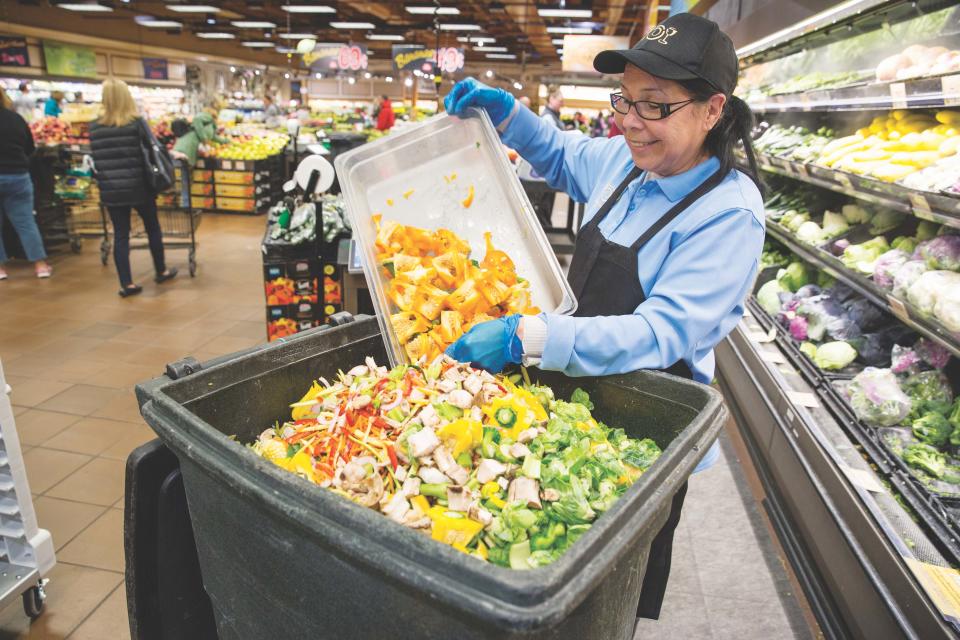'A great local solution': Should Quincy add curbside compost to its trash pickup?
QUINCY − Free food waste pickup for all residents could be on the horizon as a task force created to study composting in the city recommends the practice to reduce the cost of trash pickup and limit the amount of food and drink waste that ends up in local landfills.
Task force members Emily Lebo and Shelly Dein, Quincy's energy and sustainability manager, presented to city councilors a multiyear plan to encourage Quincy residents to compost that includes opening a food waste drop-off site, composting in schools and, ultimately, offering free curbside food waste pickup for residents.
The city took its first step toward curbside composting in 2018, when Mayor Thomas Koch formed a 10-person task force at the urging of the city council. Task force members were told to create a master plan for if and how Quincy should implement composting as part of its trash service, as well as the pros and cons of building a food-waste recycling facility in the city.
Food waste makes up about 21% of the nation's trash by weight, Lebo said, and Quincy residents create an estimated 6,300 tons of food waste per year. The state requires anyone producing more than 1 ton of food waste per week to create a food waste diversion plan. Stop & Shop, for example, diverts its food waste to food pantries and other rescue programs when possible because it's cheaper than paying to compost.
Mandatory food waste diversion is planned for small businesses and residents in the state by 2030.
"That means we will all be required to be composting," Lebo said.
More: Quincy baker competed on Food Network's 'Holiday Baking Championship'
Ho-ho-home for the holidays:South Shore gets ready to make merry
As of June 2020, 19 communities in the state offered curbside composting and 40 offer drop-off sites for food waste collection. In Quincy, residents can pay one of three private companies that offer compost pickup, and the city sells discounted backyard composters to residents who wish to compost food or yard waste on their own.
"I've been composting through Black Earth Compost for three years, as has all the members of my family in their households, and there has been no problem whatsoever with smell or rodents or anything else," Lebo said. "And it reduces the trash by an inordinate amount."
Bringing a curbside or drop-off option to Quincy would lower the city's climate change footprint; reduce the cost of trash tipping fees by an estimated $200,000 per year; result in "cleaner" trash that is not a food source for rodents; and prepare the city to address the state Department of Environmental Protection's "increasingly strict" food waste bans, Lebo said.
Concerns include attracting rodents to curbside containers that aren't property sealed or locked; people trying to compost non-natural materials; odors; and needing to pay staff at drop-off sites, Dein said.
In the short term, the task force recommends the city continue to sell home composting bins; select a food waste collection vendor who could pick up compost from a drop-off site; order supplies for curbside composting; and contact Recycling Works to evaluate the potential for having a composting site at the Department of Public Works yard.
Weymouth: Residential tax bills to rise an average of $134 in 2023
This weekend: Holiday fair will raise money to renovate kitchen at Quincy Point fire station
Within the next year, the task force wants to have a food waste separation program in public schools, a food waste drop-off site set up at the DPW and a public education campaign on the city's website and social media pages. After that, they want drop-off sites scattered across the city and composting starter kits available for residents. Eventually, Dein said they want to "get to a point where the city is offering free, curbside food waste pickup to all residents."
"This is such a great local solution to be able to take control of 20% of the city's waste," Ward 3 City Councilor Ian Cain said. "This is such a unique project and I will support it in any way possible."
Dein said many communities start their composting programs by asking residents to pay for curbside pickup that costs about $10 per week. Lebo said the cost goes down as more people sign up.
Ultimately, Dein said, the practice could be cost neutral for the city because it pays trash haulers by weight, and that cost will go down once food waste is removed from regular trash bins.

"We will probably never make money on this, but to be cost neutral in our trash pickup and then do something good for the environment is what we should expect," Councilor at-large Anne Mahoney said.
Now that the compost task force has made its recommendations, any further movement is in the hands of the mayor's administration. City councilors cannot request money for a project, they can only approve or reject what the administration puts before them.
Chris Walker, Koch's chief of staff, said the pilot program in the schools has started and a request for proposals will go out to potential vendors soon.
"There are a lot of issues that need to be looked at relative to acually creating a site at the DPW yard, but beyond that we are entirely supportive," Walker said Tuesday. "We know this is the direction we need to be going in."
Thanks to our subscribers, who help make this coverage possible. If you are not a subscriber, please consider supporting quality local journalism with a Patriot Ledger subscription. Here is our latest offer.
Reach Mary Whitfill at mwhitfill@patriotledger.com.
This article originally appeared on The Patriot Ledger: Quincy considers curbside, drop-off composting to reduce food waste

